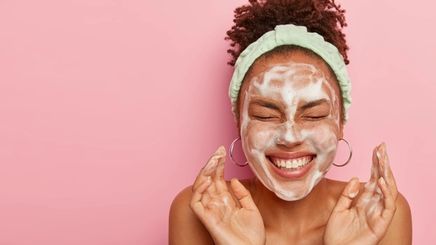
What is acne-prone skin? Aside from being a bummer, it's skin that produces excess oil, making it susceptible to breakouts. These can cause discomfort, leave scars, and do a number on your confidence. If you’re tired of feeling self-conscious and using skin-smoothing filters on all your photos, then it’s time to do something about your skin IRL—starting with the products you use.
Read on to find out the ingredients you should be looking for in your skin care for acne. Plus, the face wash for acne-prone skin, which can get you the filter-free skin of your dreams.
Your Acne-Fighting Ingredient List
While it can be exacerbated by stress, certain foods, and a lack of sleep, acne is essentially caused by excess oil and clogged pores, so you need ingredients that will address both issues. What ingredients are good for acne? Check your skincare products for these acne-fighting heavyweights:
The powerhouse: salicylic acid
This BHA (Beta Hydroxy Acid) is the pimple-fighting MVP, penetrating the skin to give your pores a deep cleanse, soothing inflamed zits, and helping reduce oil production.
The sidekick: AHAs
or AHAs don’t penetrate as deeply as BHAs and instead act as exfoliants on the skin’s surface, sloughing away dead skin cells to reveal fresh skin. Examples of AHAs are lactic and glycolic acid.
The all-naturals: tea tree oil, witch hazel, clay, and activated charcoal
is an essential oil with anti-inflammatory and anti-bacterial properties, which is why it’s so great for treating acne—it can calm down inflamed bumps and fight off acne-causing bacteria. It’s highly concentrated, which means it might be too strong for your skin on its own so it’s best if you mix it with water or a carrier oil, or use a product that lists it as an ingredient.
Witch hazel is a disinfectant and astringent that can help soak up oil and, like tea tree oil, guards your skin against bacteria. Meanwhile, both clay and activated charcoal sop up excess oil while being magnets for deep-seated dirt.
The hydrator: hyaluronic acid
Even acne-prone girls need to keep their skin hydrated to keep irritants like bacteria and pollution out, but you have to pick a moisturizing agent that doesn’t make skin any oilier. can hold 1,000 times its weight in water, so it delivers supercharged hydration without clogging your pores.
The spot treater: benzoyl peroxide
This bacteria killer is found in many acne products but should be used sparingly as it can irritate the skin when overused.
Ingredients to Avoid for Acne-Prone Skin
If you have acne, steer clear of heavy moisturizers, thick creams, and occlusives that can cause breakouts. These include petrolatum, mineral oil, beeswax, lanolin, and paraffin, to name a few. Always check the label and look for the words "non-comedogenic," which means the product will not make your acne-prone skin break out.
The Best Face Wash for Acne-Prone Skin
The best cleanser for acne-prone skin removes excess oil and impurities from your pores. POND'S Bright Miracle Ultimate Acne Control Facial Foam contains zit-zapping salicylic acid as well as herbal clay to get rid of deep-seated dirt and oil. It renews your skin by gently exfoliating the surface to reveal the radiant skin underneath.
Use this POND's face wash for acne-prone skin along with other zit-zapping products and soon you’ll have skin that you can proudly show off, no filters necessary.